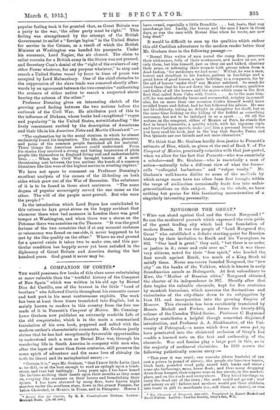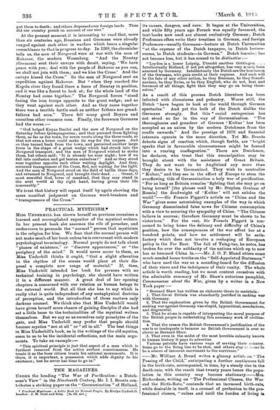N,OVGOROD THE GREAT. * " WHo can stand against God and
the Great Novgorod ?" So ran the mediaeval proverb which expressed the civic pride of the great trading city which laid the foundation of modern Russia. It was the people of "Lord Novgorod the Great" who established a definite starting-point for Russian' history by their invitation to Iturik and his Varangians in 862. "Our land is great," they said, "but there is no order or justice in it; come and rule over us." Yet it was these very citizens, noted for their "free spirit," who headed the first revolt against Ralik, too much of a King Stork to satisfy them. Norse sea-rovers founded Novgorod, the "pew city" on the banks of the Volkilov, which is known in early, Scandinavian annals as Holmgarth. At first subordinate to Kiev, the "Mother of Russian cities," Novgorod obtaiue,k the charter of its independence in 997. Shortly after that: date begins the raluahle chronicle, kept for five centuriea by monkish historians, which narrates the fluctuations and, vicissitudes of the city-State down to ite subjugation by Ivan III. and incorporation into the growing Empire of Moscow. This chronicle has been excellently translated by' Messrs. Michell and Forhes, and forms the twenty-flftli volume of the Camden Third Series. Professor C. Raymond Beazley contributes a helpful though somewhat disjoint4
introduction, and Protessoy A. A. Shaklimatov, of the
Uni-
vessity of Petrograd,—a name which does not seem yet .tct have penetrated into the cloistered seclusion of Gray's Inn —adds a learned note on the text and atithorship of tin; chronicle. War and famine play a large part in this, as in' the majority of mediaeval chronicles, In 1128 occurs thd following pathetically concise entry:— "This year it was cruel ; one osminka (Hires bushels) of rye cost a orients (a pound of silver); the people ate lime-tree leaves; birch bark, pounded wood pulp mixed with limits nod straw some ate buttereups,.moss, horse flesh ; and thus many dropping down from hunger, their corpses Imre in the streets, in the snorkel, place, and on the roads and everywhere. They hired hirelings to catty the dead eat of the teas; the Islas could not go out; trod and misery snail! fathers and mothers would put their children, into boats in gift to merchants (i.e., sell them as slaves), or else • The Chron:ek of tiorgorod, 1015.1471. Tramilatollsy Solari /Cann and 5m011 FOTIRII. Loudest: Camdms Society, Gray'. lass. W.V..
put them to death ; and others dispersed over foreign lands. Thus did our country perish on account of our sins."
At the present moment it is interesting to read that, more than six centuries ago, Russians and Germans were already ranged against each other in warfare which hears a singular resemblance to that in pr3gress to-day. In 1268, the chronicler tells us, the men of Novgorod were at war with the men of Rakovor, the modern Wesenberg. "And the Nemtsy (Germans) sent their envoys with deceit, saying, ' We have peace with you ; deal with the people of Rakovor as you can, we shall not join with them; and we kiss the Cross.' And the envoys kissed the Cross." So the men of Novgorod sent an expedition against Rakovor. But "when they reached the Kegola river they found there a force of Nemtay in position, and it was like a forest to look at; for the whole land of the Nenitsy had come together." The Novgorod forces "stood facing the iron troops opposite to the great wedge; and so they went against each other. And as they came together there was a terrible battle such as neither fathers nor grand- fathers had seen." There fell many good Boyars and countless other common men. Finally, the forsworn Germans had the worse :— "Gail helped Keyes Dmitri and the men of Novgorod on the Saturday before Quinquagesima; and they pursued them fighting them, as far as the town, for seven versts along the three roads, so that not even a horse could make its way for the corpses. And so they turned back from the town, and perceived another large force in the shape of a great wedge which had struck into the Novgorod transport; and the men of Novgorod wished to strike them, but others said `It is already too near night ; how if we fall into confusion and get beaten ourselves P And as they stood near together opposite each other waiting daylight. And they, accursed transgressors of the Cross, fled, not waiting for the light. And the men of Novgorod stood on the field of battle three days, and returned to Novgorod, and brought their dead. . . . Grant, 0 most merciful God, lover of mankind, that they may stand in the next world at thy right hand, having given their life honourably."
We trust that history will repeat itself by again showing the same manifest judgment on German word-breakers and " transgressors of the Cross."











































 Previous page
Previous page